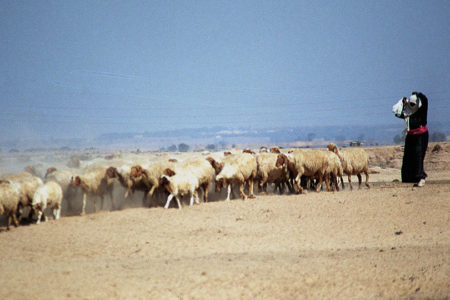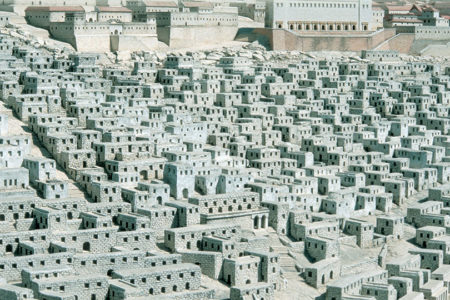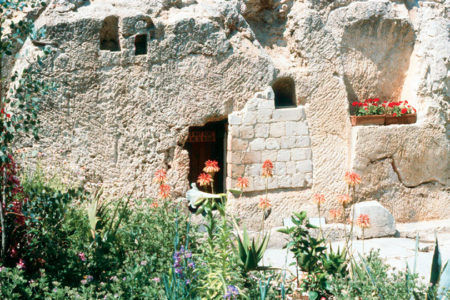Jerusalem’s Future Glory
Zechariah 2:1-13
No other city is more treasured by the Lord than Jerusalem. The prophet Ezekiel said that Jerusalem is set in the middle of the nations (Ezek. 5:5); and the prophet Ahijah called Jerusalem the city where the Lord has chosen to put His name (1 Ki. 11:36).
Likewise, there is no place on earth that fills the Jewish heart with love and loyalty like the city of Jerusalem. Jewish exiles have prayed for centuries, “If I forget thee, O Jerusalem, let my right hand forget her cunning. If I do not remember thee, let my tongue cleave to the roof of my mouth, if I prefer not Jerusalem above my chief joy” (Ps. 137:5–6).
In chapter two, Zechariah recorded another vision he received from the Lord concerning the city of Jerusalem. This vision not only described Jerusalem’s reconstruction after the Babylonian Captivity, but also foreshadows Jerusalem’s reconstruction in the Millennial Kingdom.
The Surveyor
Zechariah said, “I lifted up mine eyes again, and looked, and behold a man with a measuring line in his hand” (2:1). The phrase I lifted up mine eyes indicates that the prophet was experiencing a new vision, the third of eight received in one night. The measuring line is not just any line. The Hebrew indicates it was a surveyor’s line.
Zechariah inquired concerning the vision, “Where goest thou?” (v. 2). The man replied, “To measure Jerusalem, to see what is the breadth of it, and what is its length” (v. 2). Jerusalem is being surveyed in order to plan its restoration.
Who is the man? He cannot be the angel who spoke with the prophet in verse 3 or the “young man” in verse 4. Some commentators identify him simply as an Israelite with the occupation of a surveyor; but we know he is more than a mere man. Others see him as an angel charged with measuring Jerusalem.
Still others believe he is the Angel of the Lord, Israel’s Messiah. For in the second vision the man (1:8, 10) who appears to Zechariah is divine and identified as “the angel of the LORD” (vv. 11–12). The same can be said of the man called “The Branch” in the eighth vision (6:12–13). Furthermore, Ezekiel prophesied of a man with a similar mission (Ezek. 40:3) who also is divine (Ezek. 43:6–7).
Although Scripture does not identify the surveyor, other passages would lead one to believe that He is the divine Messiah of Israel.
The Promises
While Zechariah was receiving the surveyor’s answer, the interpreting angel, who talked with the prophet, left to meet another angel who had a revelation from God. Zechariah reported what happened:
And, behold, the angel who talked with me went forth, and another angel went out to meet him, And said unto him, Run, speak to this young man, saying, Jerusalem shall be inhabited like towns without walls for the multitude of men and cattle in it; For I, saith the LORD, will be unto it a wall of fire round about, and will be the glory in the midst of it (vv. 3–5).
The interpreting angel tells the latter angel to give God’s revelation to the “young man” (Zechariah). He is to run, or make haste, because of its urgency and thrilling news of Jerusalem’s reconstruction. This news would fill both Zechariah and the residences of Jerusalem with great joy, for it was coming when the Israelites were struggling to rebuild their city and Temple.
God gave Zechariah four promises in the third vision.
(1) Prosperity. First, Jerusalem will experience prosperity: “Jerusalem shall be inhabited like towns without walls for the multitude of men and cattle in it” (v. 4). The Hebrew word for “inhabited” means to expand or overflow the bounds of the city or village in contrast to a walled city .
Thus Jerusalem would be much larger when rebuilt because of increased population, reconstruction, and material wealth. The ultimate fulfillment of this prophecy will take place in the Millennial Kingdom when Jerusalem becomes the capital of the world.
(2) Protection. Second, Jerusalem will experience divine protection: “For I, saith the LORD, will be unto it a wall of fire round about, and will be the glory in the midst of it” (v. 5).
This is a personal word from the Lord that He and He alone will be the city’s divine Protector. The Lord will be a “wall” (i.e., ring of fire) around His people, protecting them from men or wild animals that try to hurt them. This is the greatest assurance and defense any people could be given.
Moreover, the Lord declared that He would be “the glory” in the midst of Jerusalem. This is none other than a promise of God’s Shekinah (personal) glory that once filled the Holy of Holies in the Tabernacle and the Temple. The glory that had departed (Ezek. 11:22–23) will again return to Jerusalem. Ezekiel prophesied that the Shekinah will dwell in the future Millennial Temple (Ezek. 43:1–5). Zechariah’s prophecy more fully reveals the function of God’s glory. In Temple days, only the high priest was able to get a glimpse of the Shekinah glory; but during the Millennium, the Lord will unveil His glory continually to all those dwelling in Jerusalem. The ultimate fulfillment of this prophecy will be seen in the New Jerusalem (Rev. 21:23).
(3) Population. Jerusalem’s population will be greatly multiplied. The Lord called His people home:
Ho, ho, come forth, and flee from the land of the north, saith the LORD; for I have spread you abroad as the four winds of the heavens, saith the LORD. Deliver thyself, O Zion, that dwellest with the daughter of Babylon (vv. 6–7).
The majority of Jewish people had chosen to remain in Babylon when the Lord made a way for them to be repatriated to Jerusalem; now they are encouraged to return to Jerusalem. The prophecy also looks forward to a day when God will call Israel back to its land after the Messiah’s Second Coming.
(4) Punishment. The nations who plundered and destroyed Israel will be punished:
For thus saith the LORD of hosts: After the glory hath he sent me [literally, He (God the Father) sent Me (the Servant of the Lord) after glory] unto the nations which spoiled you; . . . For, behold, I will shake mine hand upon them, and they shall be a spoil to their servants; and ye shall know that the LORD of hosts hath sent me (vv. 8–9).
In other words, the prophecy foresees the day when God the Father will send the Messiah in His First and Second Comings to manifest His glory and, at His Second Coming, bring judgment on Israel’s enemies (cf. Isa. 61:2–3; Lk. 4:17–19). Part of bringing glory to God will be to punish and plunder Israel’s enemies and reestablish Israel in its own land. When Israel’s kingdom is restored, the nation will be exalted above its enemies, who will become Israel’s servants.
In that day Israel and the world will know that God the Father sent the Angel of the Lord—Messiah—to accomplish all this. In so doing, the Messiah will prove God’s love and faithfulness in keeping His promises to Israel. When all this takes place, God’s glory will be displayed through His wisdom and character.
Jewish people are extremely precious to God. This fact is seen in verse 8: “For he that toucheth you toucheth the apple [gate] of his [God’s] eye” (cf. Dt. 32:10; Ps. 17:8).
The word apple speaks of the aperture or pupil in the iris of the eye that allows light to reflect images on the eye’s retina. The pupil is highly tender and sensitive and must be guarded from contact with any foreign object that could injure the eye.
In like manner, Jewish people are precious in God’s sight and must be guarded from injury. The Lord is highly sensitive to any individual or nation that would mistreat or harm Israel. He feels the injury to Israel as if it were done to Him, and He will bring a divine curse on all individuals and nations who harm the Jewish people (Gen. 3:15).
The Praises
The inhabitants of Jerusalem are told to praise God and rejoice over their future for three reasons.
God’s Presence. The Savior will dwell in Jerusalem: “Sing and rejoice, O daughter of Zion; for, lo, I come, and I will dwell in the midst of thee, saith the LORD” (v. 10).
The word dwell is the root word for Shekinah, indicating the Lord’s presence. Messiah will fulfill this prophecy when He takes up residence in Jerusalem and reigns from the throne of David.
Gentiles’ Position. People from every nation will come to know the Lord and be joined to Him:
And many nations shall be joined to the LORD in that day, and shall be my people; and I will dwell in the midst of thee, and thou shalt know that the LORD of hosts hath sent me unto thee (v. 11).
Gentiles who trust in the Lord will come from every nation to worship the Messiah when He rules and reigns in Jerusalem (Isa. 2:2–3; Mic. 4:1).
Judah’s Privilege. Judah will be uniquely privileged: “And the LORD shall inherit Judah as his portion in the holy land, and shall choose Jerusalem again” (v . 12). The massive conversion of Gentiles might lead one to believe that God’s promises to Israel have been annulled or abrogated. But nothing can be further from the truth.
Israel’s election is unconditional and irrevocable. Here God reaffirms His covenant commitment and again declares Israel and Jerusalem as His portion and inheritance (cf. Dt. 4:20; 9:26; 32:9; Isa. 19:25). The phrase shall choose Jerusalem again does not mean the Lord has elected Israel a second time but only that He reaffirmed His original choice.
Verse 12 is the only place where the phrase holy land appears in the Bible. It is wrong to designate the land as holy today. The land will not be holy until Israel’s sin is removed at the Messiah’s Second Coming (Zech. 3:9; 13:1). Then Israel will be called “The holy people” (Isa. 62:12) and made His priests and ministers (Isa. 61:6). These prophecies will be fulfilled in the Millennium (Zech. 14:20–21).
The Silence
Zechariah called on all men to pause and contemplate in silent awe the glorious revelation that was given: “Be silent, O all flesh, before the LORD; for he is raised up [awakened or aroused] out of his holy habitation [dwelling]” (v. 13).
This verse does not mean the Lord is asleep, but that He is incited to act in bringing God’s program to fruition. So awesome is Messiah’s coming judgment on the wickedness of Gentile nations, and His future blessing to Israel in a reconstructed Jerusalem, that the whole earth is admonished to be hushed at this prospect.
ENDNOTE
- F. Duane Lindsey, “Zechariah,” The Bible Knowledge Commentary, ed. John F. Walvoord and Roy B. Zuck (Wheaton, Ill.: Victor Books, 1978), 1,548.








Congratulations on this powerful article.
“Protection: second, Jerusalem will experience divine protection”.
Does this statement of yours give the idea that during the millennium there will still be hungry wild animals on Earth? And even thieves/burglars?
“Ezekiel prophesied that the Shekinah will dwell in the future Millennial Temple (Ezek. 43:1–5)”.
In the millennium, Jesus in person seems to be present in Jerusalem, to rule and to govern the whole world. Does this Shekinah mean that G-d Himself, the Father, will also be present in the figure of the Shekinah, inside the Temple?